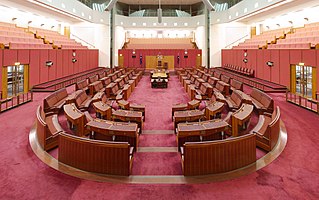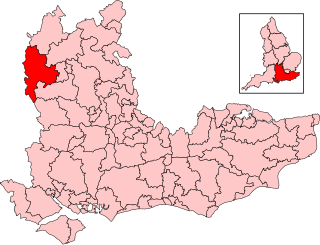Related Research Articles

The House of Commons is the lower house of the Parliament of the United Kingdom. Like the upper house, the House of Lords, it meets in the Palace of Westminster in London, England. The House of Commons is an elected body consisting of 650 members known as members of Parliament (MPs), who are elected to represent constituencies by the first-past-the-post system and hold their seats until Parliament is dissolved.

The Official Monster Raving Loony Party (OMRLP) is a political party established in the United Kingdom in 1982 by the musician David Sutch, also known as Screaming Lord Sutch, 3rd Earl of Harrow, or simply Lord Sutch. It is notable for its deliberately bizarre policies and it effectively exists to satirise British politics, and by fielding novelty candidates to offer itself as an alternative for protest voters, especially in constituencies where the party holding a safe seat is unlikely to lose it.

The United Kingdom is a constitutional monarchy which, by legislation and convention, operates as a unitary parliamentary democracy. A hereditary monarch, currently King Charles III, serves as head of state while the Prime Minister of the United Kingdom, currently Sir Keir Starmer since 2024, serves as the head of the elected government.

The Speaker of the House of Commons is the presiding officer of the House of Commons, the lower house and primary chamber of the Parliament of the United Kingdom. The current speaker, Lindsay Hoyle, was elected Speaker on 4 November 2019, following the retirement of John Bercow. Hoyle began his first full parliamentary term in the role on 17 December 2019, having been unanimously re-elected after the 2019 general election.

In some parliamentary systems, politicians are said to cross the floor if they formally change their political affiliation to a political party different from the one they were initially elected under. In Australia though, this term simply refers to Members of Parliament (MPs) who dissent from the party line and vote against the express instructions of the party whip while retaining membership in their political party.

Roger Duncan Godsiff is a British former politician who served as the Labour Member of Parliament (MP) from 1992 to 2019, for the seats of Birmingham Small Heath, Birmingham Sparkbrook and Small Heath, and Birmingham Hall Green.
An electoral alliance is an association of political parties or individuals that exists solely to stand in elections.

A writ of election is a writ issued ordering the holding of an election. In Commonwealth countries writs are the usual mechanism by which general elections are called and are issued by the head of state or their representative. In the United States, writs are more commonly used to call special elections for political offices.

Witney is a county constituency in Oxfordshire represented in the House of Commons of the Parliament of the United Kingdom. It elects one Member of Parliament by the first-past-the-post system of election, and was created for the 1983 general election.

The 2010 United Kingdom general election was held on Thursday 6 May 2010, to elect Members of Parliament to the House of Commons. The election took place in 650 constituencies across the United Kingdom under the first-past-the-post system. The election resulted in a large swing to the opposition Conservative Party led by David Cameron similar to that seen in 1979, the last time a Conservative opposition had ousted a Labour government. The governing Labour Party led by Prime Minister Gordon Brown lost the 66-seat majority it had previously enjoyed, but no party achieved the 326 seats needed for a majority. The Conservatives won the most votes and seats, but still fell 20 seats short. This resulted in a hung parliament where no party was able to command a majority in the House of Commons. This was only the second general election since the Second World War to return a hung parliament, the first being the February 1974 election. This election marked the start of Conservative government for the next 14 years.
An independent, non-partisan politician, or non-affiliated politician is a politician not affiliated with any political party or bureaucratic association. There are numerous reasons why someone may stand for office as an independent.

The Representation of the People Act 1983 is an Act of the Parliament of the United Kingdom. It changed the British electoral process in the following ways:
The 1929 Bishop Auckland by-election was a parliamentary by-election held on 7 February 1929 for the British House of Commons constituency of Bishop Auckland in County Durham.
Electoral reform is a change in electoral systems which alters how public desires are expressed in election results.
There are five types of elections in the United Kingdom: elections to the House of Commons of the United Kingdom, elections to devolved parliaments and assemblies, local elections, mayoral elections, and Police and Crime Commissioner elections. Within each of those categories, there may also be by-elections. Elections are held on Election Day, which is conventionally a Thursday, and under the provisions of the Dissolution and Calling of Parliament Act 2022 the timing of general elections can be held at the discretion of the prime minister during any five-year period. All other types of elections are held after fixed periods, though early elections to the devolved assemblies and parliaments can occur in certain situations. The five electoral systems used are: the single member plurality system (first-past-the-post), the multi-member plurality, the single transferable vote, the additional member system, and the supplementary vote.

Helen Grant is a British politician who served as the Member of Parliament (MP) for Maidstone and The Weald from 2010 until 2024 when the constituency was abolished, and subsequently Maidstone and Malling since July 2024. A member of the Conservative Party, she succeeded Ann Widdecombe, who was first elected in 1987. She has served as Shadow Solicitor General since November 2024.

The Libertarian Party, also known as the Libertarian Party UK (LPUK), is a libertarian political party in the United Kingdom led by Martin Day. The party believes in having a written constitution for the UK which "holds the individual to be above the State."

The United Kingdom Alternative Vote referendum, also known as the UK-wide referendum on the Parliamentary voting system was held on Thursday 5 May 2011 in the United Kingdom to choose the method of electing MPs at subsequent general elections. It occurred as a provision of the Conservative–Liberal Democrat coalition agreement drawn up in 2010 and also indirectly in the aftermath of the 2009 expenses scandal. It operated under the provisions of the Parliamentary Voting System and Constituencies Act 2011 and was the first national referendum to be held under provisions laid out in the Political Parties, Elections and Referendums Act 2000. Many local elections were also held on this day.

The Fixed-term Parliaments Act 2011 (FTPA) was an Act of the Parliament of the United Kingdom which, for the first time, set in legislation a default fixed election date for general elections in the United Kingdom. It remained in force until 2022, when it was repealed. Since then, as before its passage, elections are required by law to be held at least once every five years, but can be called earlier if the prime minister advises the monarch to exercise the royal prerogative to do so. Prime ministers have often employed this mechanism to call an election before the end of their five-year term, sometimes fairly early in it. Critics have said this gives an unfair advantage to the incumbent prime minister, allowing them to call a general election at a time that suits them electorally. While it was in force, the FTPA removed this longstanding power of the prime minister.

The United Kingdom General Election 2015 – Party Spending Investigation was a probe involving the UK Electoral Commission, numerous police forces, and the Crown Prosecution Service into spending by political parties and candidates, primarily during the 2015 general election campaign. This co-ordinated investigation has been described as 'an unprecedented and extraordinary situation'.
References
- ↑ "General election 2019: How political parties choose election candidates". BBC News. 14 November 2019. Retrieved 10 May 2021.
- ↑ See, for example Halesowen News, September 2008, North Devon Gazette, September 2008 [ permanent dead link ] or the Daily Post, September 2008.